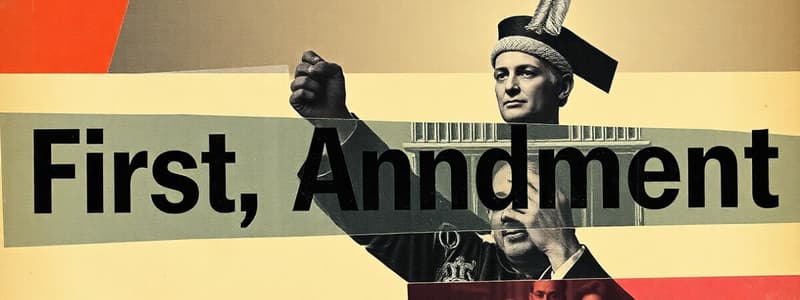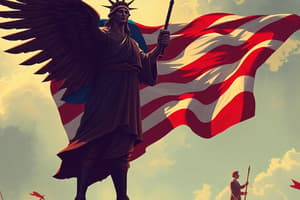Podcast
Questions and Answers
The Tinker Test states that students have free speech rights except when their speech substantially ______ school operations.
The Tinker Test states that students have free speech rights except when their speech substantially ______ school operations.
disrupts
Bethel School District v. Fraser (1986) involved the Supreme Court ruling that schools can punish ______ speech.
Bethel School District v. Fraser (1986) involved the Supreme Court ruling that schools can punish ______ speech.
lewd
In Hazelwood School District v. Kuhlmeier (1988), the Court established that schools have control over speech in ______-sponsored activities.
In Hazelwood School District v. Kuhlmeier (1988), the Court established that schools have control over speech in ______-sponsored activities.
school
Morse v. Frederick (2007) ruled that schools can punish student speech that promotes illegal ______ use.
Morse v. Frederick (2007) ruled that schools can punish student speech that promotes illegal ______ use.
Signup and view all the answers
The three major categories of speech exceptions to Tinker are lewd speech, school-sponsored speech, and ______ speech.
The three major categories of speech exceptions to Tinker are lewd speech, school-sponsored speech, and ______ speech.
Signup and view all the answers
Substantial disruption is defined as something that meaningfully interferes with the school's ability to ______.
Substantial disruption is defined as something that meaningfully interferes with the school's ability to ______.
Signup and view all the answers
Study Notes
The First Amendment and Freedom of Speech
-
Freedom of speech means the ability to express oneself, particularly on a controversial subject, without fear of punishment for what one says.
-
The First Amendment to the Constitution states that Congress shall make no law abridging the freedom of speech.
-
The amendment protects freedom of expression from government intrusion but not from individuals or other organizations.
-
Public schools are technically part of the government as they are funded by taxpayers and run by state and local school boards.
Tinker v. Des Moines Independent Community School District
-
In 1965, Mary Beth Tinker and her brother John, along with a group of students, planned to wear black armbands to school to protest the Vietnam War.
-
The school authorities prohibited the students from wearing armbands.
-
The Tinker family sued the Des Moines School District, claiming that the school's actions violated their First Amendment rights.
-
In 1969, the Supreme Court ruled 7-2 in favor of the Tinkers, establishing that the First Amendment applies to students in public schools.
-
Justice Abe Fortas wrote the majority opinion, stating that students do not shed their constitutional rights at the schoolhouse gate.
-
Justice Hugo Black dissented, arguing that the school's authority to maintain order should be prioritized over student speech rights.
-
The Court created the Tinker Test, which states that students have free speech rights except when their speech substantially disrupts school operations or impinges on the rights of others.
-
Substantial disruption is defined as something that meaningfully interferes with the school's ability to teach.
Major Student Speech Cases Post-Tinker
-
Bethel School District v. Fraser (1986): The Supreme Court ruled that schools can punish lewd speech, even when off-campus, based on the "vulgarity" of the language.
-
Hazelwood School District v. Kuhlmeier (1988): The Court established that schools have significant control over speech in "school-sponsored" activities, such as newspapers and assemblies.
-
Morse v. Frederick (2007): The Court ruled that schools can punish student speech that promotes illegal drug use.
-
The three major categories of speech that became exceptions to Tinker: lewd speech, school-sponsored speech, and pro-drug speech.
Brandi Levy's Case: Mahanoy Area School District v. B.L.
-
Brandi Levy, a high school student, posted a Snapchat story that contained a vulgar message related to cheerleading, after she was cut from the varsity team.
-
The school suspended Brandi from the cheerleading squad.
-
Levy sued the Mahanoy Area School District, arguing that the school violated her First Amendment rights.
-
The Supreme Court's decision in Brandi Levy's case is yet to be determined but will address the boundaries between student speech off-campus and the school's authority.
Supreme Court Ruling on Student Speech
- The Supreme Court ruled 8 to 1 in favor of Brandi Levy, a student who was punished for an off-campus social media post criticizing her cheerleading squad.
- The court found that Brandi's post did not cause substantial disruption at school and therefore was protected by the First Amendment.
- Although the court ruled in favor of Brandi, it did not provide clear guidance on the limits of school authority to punish off-campus speech.
- The court acknowledged the difficulty in addressing online bullying and harassment, stating that schools might be able to punish off-campus speech in certain situations but did not provide clear rules.
Impact of the Ruling
- This ruling was the first time in 50 years that a student won a free speech case at the Supreme Court.
- The ruling's impact on future cases remains uncertain, but it reinforces the importance of free speech in American society.
- Justice Breyer, who wrote the majority opinion, emphasized the importance of schools as "nurseries of democracy" where students can learn to engage in civic discourse.
Importance of Free Speech for Students
- Students should be allowed to express their views, even if they are controversial or unpopular.
- Freedom of speech helps students develop critical thinking skills and engage in civic discourse.
- Students have a right to dissent and challenge the status quo.
Legacy of the Tinker Case
- The ruling in the Brandi Levy case echoes the principles established in the Tinker v. Des Moines Independent Community School District case (1969).
- The Tinker case upheld a student's right to wear black armbands to school in protest of the Vietnam War. Both cases highlight the importance of free speech in schools to prepare students for active citizenship.
- The Tinker case and the Brandi Levy case demonstrate the power of ordinary citizens to shape constitutional rights.
- Students today are still facing challenges in exercising their right to free speech in the digital age.
The First Amendment and Freedom of Speech
- The First Amendment to the Constitution protects freedom of expression from government intrusion.
- This applies to public schools, which are part of the government due to taxpayer funding.
- Public schools can regulate student speech when it meaningfully interferes with school operations or the rights of others.
Tinker v. Des Moines Independent Community School District
- Students planned to wear black armbands to school to protest the Vietnam War.
- The school prohibited the students from wearing the armbands and the students sued.
- The Supreme Court ruled in favor of the students, establishing that students have free speech rights in school.
- The court coined the Tinker test, stating that students have free speech rights except when their speech "substantially disrupts" school operations or impinges on the rights of others.
Major Student Speech Cases Post-Tinker
- Schools can punish lewd language, even when off-campus, based on the "vulgarity" of the language.
- Schools have significant control over speech in "school-sponsored" activities, such as newspapers and assemblies.
- Schools can punish speech that promotes illegal drug use.
Mahanoy Area School District v. B.L. (Brandi Levy's Case)
- A student posted a vulgar message on Snapchat after being cut from her high school cheerleading squad.
- The school suspended her from the cheerleading squad and the student sued.
- The Supreme Court ruled in favor of the student, determining that the post did not cause substantial disruption at school.
Impact of the Ruling
- The ruling reinforced the importance of free speech and its protection in schools.
- The court acknowledged the difficulty of addressing online bullying and harassment, stating that schools might be able to punish off-campus speech in certain situations but did not provide clear rules.
Legacy of the Tinker Case
- The Brandi Levy ruling echoes the principles established in the Tinker case.
- Both cases highlight the importance of free speech in preparing students for active citizenship.
- The cases demonstrate that students can shape constitutional rights, even in the digital age.
Studying That Suits You
Use AI to generate personalized quizzes and flashcards to suit your learning preferences.
Description
Test your knowledge of the First Amendment and its implications for freedom of speech, particularly in the context of public schools and landmark cases like Tinker v. Des Moines. This quiz will cover essential concepts and historical events related to students' rights to express themselves. Are you ready to challenge your understanding of these crucial issues?




